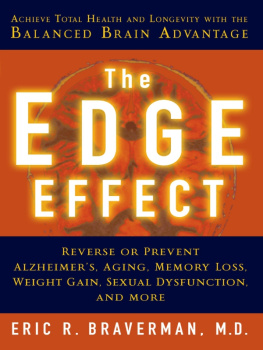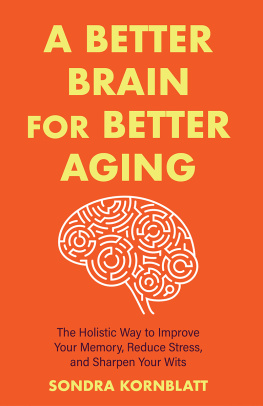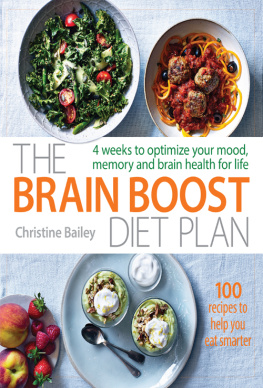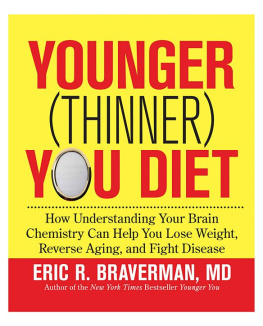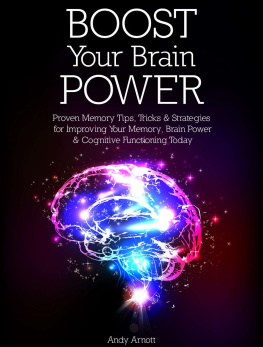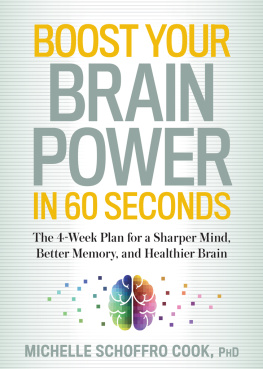

To my son, J. J. Braverman, for his great contributions toward a new world order for smarter people; to my daughter, Ellie, for all her assistance; and to my three smallest children, who live the Brain Advantage paradigm with me as team DADS: A ri, D aniel, and S teven.
CONTENTS
ACKNOWLEDGMENTS
T he creation of this book could not have been possible without the help of many individuals. I would like to thank my agent, David Vigliano, and my successful team at Rodale, led by Pam Krauss and Andrea Au Levitt. I would also like to thank my writer, Pam Liflander, for her unique skills, insights, and attentiveness in helping to get my ideas onto these pages.
I am grateful to my colleagues at the PATH Medical Center, Tatiana Karikh, MD, and Richard Smayda, DO, who have always been invaluable critics of my work. I am also fortunate to have a gifted team of medical and administrative personnel who have helped turn my research and ideas into successful work. Their skills are unsurpassed, and I am lucky to have them: Uma Damle; Victoria Gibbs; Melissa Dispensa; Anish Bajaj, DC; John Pillepich; Stanley Huang; and Preeti Pusalkar. I would also like to thank my medical staff members, whose loyalty and dedication to helping my patients cannot go unnoticed: Ellie Capria, RPA-C; Rosina Giaccio-Williams, RPA-C; and Dallas Worth, RPA-C.
And, finally, to my patients, the greatest teachers of all.
INTRODUCTION
I n my experience, getting older has always meant getting better. Today, my 54-year-old body is stronger, leaner, and seemingly younger than ever before. Ive mastered a healthy diet, so I can eat a full complement of delicious foods without worrying about gaining weight. I exercise daily, so I know that Im maintaining strong bones, increasing muscular strength and mass, and all the while improving my metabolism. But most important, my mind is working optimally. I know this because Im experiencing the three hallmarks of a balanced brain: I feel healthy, happy, and wise.
Overall good health cannot occur without a healthy brain; yet living without disease is only one aspect of staying young. In order for you to be able to enjoy and succeed in life for years to come, your cognitive functioning needs to remain at its peak even as you get older. A balanced, healthy brain ensures just that, so that you can continue to get smarter, remember, and stay focused and attentive.
Maturity and a calm, stable brain have also given me the ability to be a happier person. I can focus on the positive aspects of life instead of the negative, even during the most stressful times. While my days are demandingrunning a busy medical practice and a brain research foundation, and raising five kidsI can manage it all without letting stress burn me out or creating anxieties. Whats more, my positive attitude allows me to concentrate fully on making the right decisions for my patients, and particularly for myself, so that I can get ahead instead of dwelling on what is holding me back.
Research has shown that the old adage is correct, with a twist: Wisdom really does come with age, but only when you have a balanced, healthy brain. As a healthy brain ages, it begins to reorganize, and consequently, we literally act and think differently. Our judgment improves, and we can see new patterns and connections, or what author Barbara Strauch points out in her book The Secret Life of the Grown-Up Brain as the interwoven layers of knowledge that allow us to instantly recognize similarities of situations and see solutions. Over the years Ive also noticed that my healthy, fast brain has helped me become more empathetic to those around me. I can see different perspectives and resolve problems at home and in my medical practice. The insights Ive developed about the human conditionwhat truly motivates and drives peopleallow me to be a better communicator and a better doctor.
My goal for this book is to teach you how to balance your brain so that you can become happy, healthy, and, most important, wise. The key to your success will be keeping your brain young for the rest of your life. Education is the greatest ambition that the human race possesses, and your mandate is to take advantage of every opportunity to learn, which can only be possible if you can keep your brain as young as a 30-year-olds.
My patients have come to understand, as you will, that my head first approach to health care is the only way to avoid the ravages of aging, and Im not just talking about the body. My patients come from all over the country for many reasons, but more often than not, they are beginning to worry about their aging brains, and what they can do to reverse or avoid a decline in cognitive health.
RECOGNIZING THE PROBLEM
One of the most distressing aspects of getting older is the thought of losing your mind. You may start worrying when you cant find your keys that youre heading straight toward dementia, the acquired deterioration in cognitive abilities that impairs the successful performance of daily living. Youre probably afraid of becoming the stereotypical grandparent who forgets a grandchilds name, the postmenopausal woman who cant find her glasses, or the retired man who cant remember where he parked his car. These senior moments are all real signs that your brain is getting old and, sometimes, can actually be older than your chronological age.
A second problem is something I call the performance gap. As we get older, many of us experience an increase in familial or professional obligations: taking care of older parents at the same time that you are taking care of your own children, or achieving a higher status at work that often is accompanied by additional responsibilities. Unfortunately, these changes often occur simultaneously with a loss of brain power: Were asked to do more, yet at the same time our brain is actually doing less.
Business writer Dr. Laurence J. Peters first discovered and called this realization the Peter Principle, which he defined as each persons ability to rise to their own level of incompetence. But now we know that the problem he identified is not apathy or sociology: Its biology. Research clearly shows that your brainalong with everything else in your bodychanges as you age. These performance gaps begin as early as in your thirties and can increase to dangerous levels from ages 50 to 70. This means that at the time when we should be leading our lives the most intelligently, we are already losing our ability to reason and remember.
If you believe that you are experiencing even the subtlest changes in your memory and attention, youre not imagining things. The brain is like a superhighway for information, and an aging brain is like a highway after a jackknifed tractor trailer accident. Everything stops. Worse, the abuse the highway has taken over the years has caused it to be riddled with potholes. The brain actually atrophies in the same way that your muscles do when you dont exercise. Without the proper care, your brain literally cools, then shrinks and dries out. Just like a grape turns into a raisin, an aging brain loses cells and volume. When this happens, your brain processing speed and power begin to diminish, and you lose the ability not only to think clearly but also to rest effectively or stay calm. This is true for both men and women: We lose 7 to 10 milliseconds of brain speed for each decade, and there are 1,000 milliseconds in just 1 second. Since most of us think at a speed of only 100 milliseconds, a 20 percent loss of processing speed over 20 to 30 years is enormous, even if it is too small for us to evaluate on our own.
Next page

